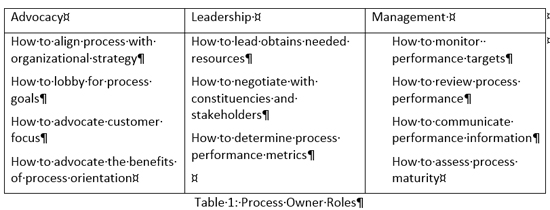The late, great Yogi Berra once said, “Baseball is 90% mental and the other half is physical.” We could say something similar – “process ownership is ninety percent leadership and the other half is management.”
Process ownership was arguably first described by Dr. Geary Rummler and Mr. Alan Brache, in their book, Improving Performance: How to Manage the White Space on the Organization Chart in 1990. They described the role of process owners as one which intended to “oversee the cross-functional performance of a process.” Note that it did not attempt to “represent a second organizational structure” – instead it was described as a role that emphasized collaboration across organizational boundaries.
Other thought leaders, such as Dr. Michael Hammer, have extolled the virtues of process ownership –and argued that companies should establish process owners, process councils, and other aspects of process governance to manage eight to fourteen core, cross-functional processes. At the enterprise level, process owners need to be senior people, with the energy and respect to make things happen.
The role of the process owner has been described as one that is focused on the effective improvement and management of an end-to-end business process. Process owners have been characterized as senior managers, with credibility and clout, with a clear focus on driving collaboration across departments and motivating and advising both project teams and continuous-improvement teams.[i]
Frankly, the track record of process owners has been somewhat disappointing. In part, that is due to the difficulty of breaking down silos and challenges in obtaining budget and resources. But it is also related to a deficit of knowledge and skill in the key areas of advocacy, leadership and management as outlined in Table 1 below.

Organizations often stumble in sustaining process ownership in some or all of the following ways:
- Process owners are appointed at middle management levels with responsibility for processes of small scope and are not supported by executive process-owner appointments for the improvement and management of the firm’s end-to-end processes.
- The role of the process owner is divorced from the fundamental management framework of the firm and process owners lack a clear voice in making decisions around resources and priorities.
- There is a lack of adequate and continuing training and education on the role of the process owner.
Given the increasing popularity of shared services organizations, there is now a chance that in large, global organizations, there will be more emphasis on end-to-end global process ownership as a fundamental concept within and beyond shared services. In such organizations, the impact of M&A, transformation, and new technology may drive home the value of the global process owner.
At BPMInstitute.org we anticipate increasing interest in BPM governance and offer a course on BPM Governance and Centers of Excellence to assist organizations evolve their BPM practices from simple process improvement towards process management. This course builds a comprehensive understanding of how to establish process governance with a focus on the emerging roles of process owner, process council, and the process office. It provides guidance on how to define and implement process governance.
We encourage current and prospective process owners to ask and answer the following questions:
- What should I do to be an “advocate” for a process based view?
- How can I best drive strategic alignment and customer focus?
- How do I prioritize process improvement opportunities?
- How do I set up a continuous improvement team?
- What is my role in promoting process education and training?
- What probing questions should I be asking during the project definition stage? What about the analysis stage? Process design? Etc.
- How do I best fulfill my role in the implementation of new process designs?
If you are moving into a process owner role or working on a project that requires broad cross functional collaboration, we invite you to contact us for answers to these fundamental questions.
[i] Spanyi, Andrew, Operational Leadership, Business Expert Press, 2010

















